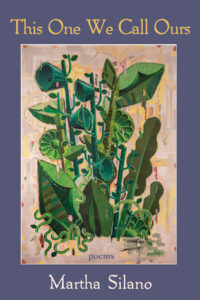 Review by Jeannine Hall Gailey
Review by Jeannine Hall Gailey
A Passionate Plea for a Dying Planet: Martha Silano’s This One We Call Ours
In Martha Silano’s sixth book, the Blue Lynx-prize winning This One We Call Ours from Lynx House Press, the call for action is clear. The world is quite literally burning – fire trucks, smoke in the air, birds leaping from nests to escape the heat. The pandemic is mentioned briefly, but the star of the show, so to speak, is not humanity’s suffering, but the planet’s. Paying attention to wildfires, storms, and dwindling economic and natural resources is a way of preserving a world the poet clearly loves.
I have a degree in biology (with a special interest in environmental toxicology) so this book’s subject matter was immediately appealing to me. I’m also a fan of apocalyptic poetry, so let’s say it was doubly appealing. And while the anxieties within the book start out in a whisper, by the end they are a roar. The section titles hint amusingly at what’s to come: the first section, for example, is called “Carry an Inhaler, Stuck Indoors with Air Purifiers, Air Quality Index Apps Season (formerly autumn)”. In the third poem in the book, “After Apple Picking, Late Anthropocene” the speaker goes apple picking, but instead of writing a sensual poem about enjoying the experience, is obsessed with canning the apples for public schools and food banks after she returns home, obviously trying to preserve the experience before it disappears or turns rotten. From that poem:
…I’m supposed to be grading 22 papers
but instead, I’m coring apples for sauce, the speckled
and worm holed. Cooking them down, placing them
in sterilized jars…” (22)
There is a LOT of canning in the book, which leads me to believe that this is a purposeful metaphor; that the speaker’s desire to preserve things exactly as they is overwhelming her ability to live in or enjoy the moment.
As in Silano’s other books, her trademark wit, warmth and wordplay suffuse this book about catastrophe. In “Once,” “…Falling water/ and falling in love. Before long there was work, and there was wine.” (17) My favorite poems are the ones where the speaker starts imagining herself as an aging female orca (as she does in “Self-Portrait as Southern Resident Orca,”) or when she imagines a text conversation between herself and her prepper-minded brother in “When My Brother Texts You Guys Have a Weapon?” In both of these poems, we get a closer insight into the mind of the speaker.
If the last few years the headlines have had a lot of people concerned about climate change, or have motivated more than one person to consider what they can do to help save the planet, help their children deal with anxiety about melting glaciers or disappearing species, Silano magnifies the headlines with an eye towards detail. In “Failed Attempt at Mythmaking,” she focuses her poetic eye on juvenile terns dead after jumping from nests too hot to survive. “The ones that lived/ / were treated for burns on their feet.” (86) She writes a letter to grandchildren apologizing for what they have lost, letter to a dying mother about what she is afraid to reveal to her, turning her attention to the future generations and past.
While Silano’s previous books have dealt with similar subject matter – physics, biology and the end of the world, the science of human psychology – this new book make the danger that shimmers in the background of her other books more menacing and urgent. She ends the book with a note of hope in the second-to-last poem, “We Are All Magnificent,” which invokes dancing to Lana Del Rey, poppies and fox tails, praising that which is still alive and still beautiful. A note that helps motivate us to, like the speaker, preserve the things worth preserving in our lives and on our planet.
This One We Call Ours by Martha Silano
Lynx House Press, 2024
Hardcover, $25.00
ISBN: 9780899242002
Jeannine Hall Gailey is a poet with MS who served as the second Poet Laureate of Redmond, Washington. She’s the author of six books of poetry, the latest being Flare, Corona from BOA Editions. She has reviewed books for The Rumpus, Poetry Northwest, American Poetry Review, and others. Her web site is www.webbish6.com
